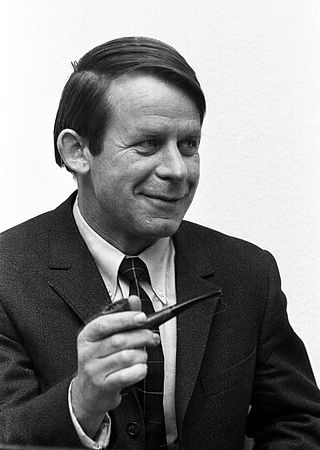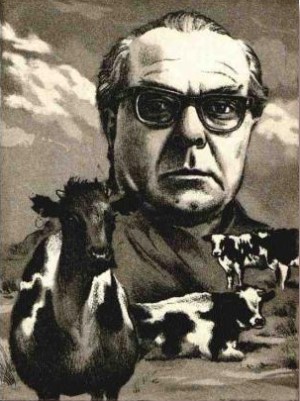
Friedrich Heinrich Karl de la Motte, Baron Fouqué was a German writer of the Romantic style.

Siegfried Lenz was a German writer of novels, short stories and essays, as well as dramas for radio and the theatre. In 2000 he received the Goethe Prize on the 250th Anniversary of Johann Wolfgang von Goethe's birth. He won the 2010 International Nonino Prize in Italy.

Johannes Mario Simmel, also known as J. M. Simmel, was an Austrian writer.
John Edwin Woods was an American translator who specialized in translating German literature, since about 1978. His work includes much of the fictional prose of Arno Schmidt and the works of contemporary authors such as Ingo Schulze and Christoph Ransmayr. He also translated all the major novels of Thomas Mann, as well as works by many other German writers.

Klaus Theweleit is a German sociologist and writer.

The Gespensterbuch is a collection of German ghost stories written by August Apel and Friedrich Laun and published in seven volumes between 1810 and 1817. Volumes five to seven were also published under the title Wunderbuch. The final volume was published after Apel's death, with stories by his friends Friedrich de la Motte Fouqué and Carl Borromäus von Miltitz. Laun, Fouqué, Miltitz, and Caroline de la Motte Fouqué followed up on the series by publishing another book of ghost stories Aus der Geisterwelt (1818).

Wolfgang Kraushaar is a political scientist and historian. After a residency at the Hamburger Institut für Sozialforschung from the 1980s until 2015. In 2015 he continued his research at the Hamburg Foundation for the Promotion of Science and Culture also in Hamburg, Germany.

Johann Karl Wezel, also Johann Carl Wezel, was a German poet, novelist, and philosopher of the Enlightenment.
Johann Gottfried Schnabel was a German writer best known for his novel Insel Felsenburg. He published his works under the pen name Gisander.

Bottom's Dream is a novel published in 1970 by West German author Arno Schmidt. Schmidt began writing the novel in December 1963 while he and Hans Wollschläger were translating the works of Edgar Allan Poe into German. The novel was inspired by James Joyce's novel Finnegans Wake, particularly Schmidt's use of columns, which Schmidt claimed was borrowed from the Wake.
The Chainbearer; or The Littlepage Manuscripts is a novel by the American novelist James Fenimore Cooper first published in 1845. The Chainbearer is the second book in a trilogy starting with Satanstoe and ending with The Redskins. The novel focuses mainly on issues of land ownership and the displacement of American Indians as the United States moves Westward.

Hans-Michael Bock is a German film historian, filmmaker, translator and writer.

Jan Philipp Fürchtegott Reemtsma is a German literary scholar, author, and patron who founded and was the long-term director of the Hamburg Institute for Social Research. Reemtsma lives and works mainly in Hamburg.

Caroline Philippine von Briest was one of the most prolific German women writers of the Romantic period. She wrote novels, short stories, fairy tales, as well as essays, on Greek mythology, on the history of fashion, and travelogues. Her numerous works gained her a high degree of celebrity.

Rudi Schuricke was a popular German singer and actor. In the 1930s he was Second Tenor with the Kardosch Singers, a popular vocal ensemble of the time. When the group dissolved in 1935, Schuricke joined the Spree Revellers and later proceeded to found his own vocal group, the Schuricke Terzett. He also appeared as a solo singer with many popular orchestras of the 1930s and 1940s. His 1949 recording of "Capri-Fischer" was a "smash hit" in Germany. Even as late as the mid-1950s, he was still a successful musical artist. In 1954 alone, his song "Moulin Rouge" was the 74th most purchased single on the German year-end chart and another of his songs "Das Märchen unserer Liebe" appeared on the German Top50 chart. The advent of the rock 'n' roll age, however, soon made his music out-dated.

Norbert Niemann is a German writer.
Friedrich Ernst Hopp was an Austrian actor and writer.

Gotthilf Weisstein was a German journalist, writer and bibliophile.
Wilhelmine von Schwertzell (1787-1863) was a German author, lieder composer, and folklorist who helped Wilhelm Grimm collect fairy tales.

Caliban over Setebos is a short story by Arno Schmidt. It was first published in 1964 as the conclusion of the ten stories in the volume Kühe in Halbtrauer. It tells how the poet Georg Düsterhenn travels to a Lower Saxony village to see his childhood sweetheart again. However, he feels repulsed by her, observes lesbian group sex on his nightly departure and narrowly escapes the angry women who have discovered him. These burlesque adventures are depicted against the backdrop of the ancient Orpheus myth. There are numerous other allusions to ancient myths as well as to works by Robert Burns, Robert Browning, James Joyce and others. The text is an example of Schmidt's psychoanalytic-oriented etymological theory, developed shortly before. It is considered "the literary masterpiece" among Schmidt's shorter works.
![Arno Schmidt, from an illustration by Jens Rusch [de] for his story Kuhe in Halbtrauer KueheinHalbtrauer.jpg](http://upload.wikimedia.org/wikipedia/commons/thumb/e/ed/KueheinHalbtrauer.jpg/220px-KueheinHalbtrauer.jpg)


![Arno Schmidt Foundation [de] Arno-Schmidt-Stiftung.jpg](http://upload.wikimedia.org/wikipedia/commons/thumb/2/28/Arno-Schmidt-Stiftung.jpg/220px-Arno-Schmidt-Stiftung.jpg)














